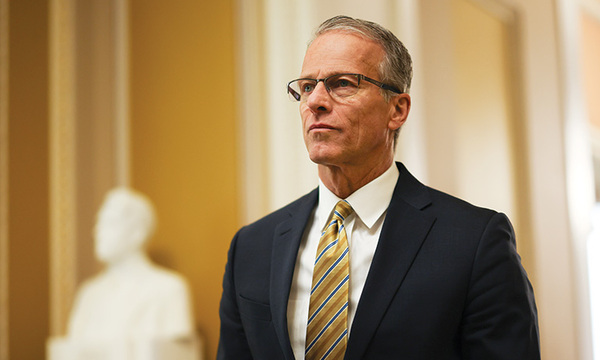The leaders of a new, Christian movement think theyŌĆÖve solved a centuries-old mystery: why men are absent from church. But their answer isnŌĆÖt politically correct.
They believe Christianity has become feminized.
There are generally more women than men in every type of church, in every part of the world, according to church growth experts like Patrick Johnstone, author of Operation World.
A traditional explanation is that women are more spiritual than men. But the leaders of this new movement suggest that the churchŌĆÖs music, messages and ministries cater to women. One of the leaders is David Murrow, author of a provocative book Why Men Hate Going to Church (Nelson Books), who spoke with Biola Connections.
The result of this feminization is that many men, even Christian men, view churches as ŌĆ£ladies clubsŌĆØ and donŌĆÖt go ŌĆö or they often go to please their wives. MurrowŌĆÖs solution is to restore a masculine ethos. Many menŌĆÖs ministers, including some Biolans, agree.
But isnŌĆÖt the reverse true ŌĆö that the church is controlled by men?
True, 93 percent of senior pastors in America are men, according to evangelical pollster George Barna. But, the majority of attendees in a typical church are women. Barna goes so far as to refer to women as ŌĆ£the backbone of the Christian congregations in America.ŌĆØ
ŌĆ£[I]tŌĆÖs not too hard to discern the target audience of the modern church: a middle-aged to elderly woman,ŌĆØ Murrow said in an interview with Faithreader.com.
The same claim was made by an earlier, more academic book, The Church Impotent: The Feminization of Christianity (Spence Publishing Company), by Leon J. Podles, a senior editor of Touchstone Magazine. But MurrowŌĆÖs book has had a bigger impact among evangelicals and has been featured by the New York Times, the Washington Post and the Wall Street Journal.
The book has resonated with many men ŌĆö like Max West, from Payson, Ariz., who wrote in a review on Amazon.com: ŌĆ£[It] opened my eyes as to why I have had such a miserable church experience for the last 30 years.ŌĆØ
Robert York, from Tigard, Ore., wrote: ŌĆ£It has ŌĆ” helped me identify why I've been so frustrated with church so many times.ŌĆØ
But Murrow said he addressed his book mainly to women, including married women who have been disappointed over their husbandsŌĆÖ lack of involvement and to single women who have bemoaned the lack of single, churchgoing men. He said women ŌĆö who have felt powerless getting men to attend church ŌĆö actually have the most influence in the churches and, thus, the most power to reverse the feminization.
Even MurrowŌĆÖs critics ŌĆö who accuse him of promoting a ŌĆ£hypermasculinityŌĆØ ŌĆö agree that Murrow has drawn attention to an alarming gender gap.
Mind the Gap
The gender gap began as early as the 13th century, according to some church historians. Others say it began during the Industrial Revolution. Nancy Pearcey, a visiting scholar at Biola, outlines this theory in her book Total Truth: Liberating Christianity From Its Cultural Captivity (Crossway Books).
Pearcey said industrialization forced men to seek work away from home, in factories and offices, which created a split between the public and private spheres of life. The public sphere became secularized through the new values of competition and self-interest, and the private sphere came to represent the old values of nurturing and religion, Pearcey said. Thus, religion came to be seen as for women and children and not as relevant to the ŌĆ£realŌĆØ world of business, politics and academia, she said.
Soon, in churches, women began to outnumber men, Pearcey said. So, male pastors began to adapt churches to their female demographic, she said.
But, interestingly, the gender gap is distinct to Christianity, according to Murrow and Podles. Other religions seem to have a gender balance or even more men than women ŌĆö including Hinduism, Buddhism, Judaism and Islam, they said.
MenŌĆÖs absence is especially noteworthy, they said, given that men were a strong force in the early church.
An exception to the gender gap may be found in some Muslim countries, like Morocco, where churches of Muslim converts are sometimes almost entirely men, according to Johnstone. But he estimates that, worldwide, the church is 66 percent women.
In America, among evangelical churches, 57 percent of members are women and, among mainline Protestant churches, 66 percent are women, according to a 1998 book American Evangelicalism (University of Chicago Press).
The imbalance is greatest in rural churches, small churches, older churches, traditionally black denominations, and in liberal churches, Murrow said, citing research from the 1998 National Congregations Study. ItŌĆÖs smallest in non-denominational and Baptist churches, he said.
║┌┴Ž└·╩Ę 23 percent of married women attend without their husbands, according to Murrow.
The men who do attend show less commitment, including less participation in Sunday School, small groups and service activities, according to Barna. Men also report less practice of spiritual disciplines like tithing, Bible reading, evangelism and prayer.
Ladies Clubs
Gender differences explain why more women are drawn to church than men, according to Murrow and Podles. They believe these differences are revealed by the Bible, biology, anthropology, psychology and human experience.
Stereotypical gender differences have become so accepted that they are assumed in standardized psychological tests. The MMPI, for example, seeks to measure whether a person is more masculine or more feminine based on the personŌĆÖs interest in activities that are typically preferred by men or women.
To describe many women, Murrow lists traits like ŌĆ£relational,ŌĆØ ŌĆ£nurturingŌĆØ and ŌĆ£peace-making.ŌĆØ He describes many men as ŌĆ£goal-driven,ŌĆØ ŌĆ£competitiveŌĆØ and ŌĆ£adventurous.ŌĆØ These differences show up in the types of movies many women and many men like: romantic vs. adventure films, Murrow said. In sum, women thrive when secure, and men thrive when challenged, he said.
But Dr. Gary Strauss, a professor in BiolaŌĆÖs Rosemead School of Psychology, warns that Murrow may be promoting a ŌĆ£hypermasculinityŌĆØ ŌĆö the idea that all men should fit the stereotypical norm of a ŌĆ£manŌĆÖs man,ŌĆØ like the Marlboro Man ŌĆö tough, outdoorsy and self-reliant.
ŌĆ£He seems to place such a strong emphasis on the hypermasculine image that he doesnŌĆÖt adequately affirm men of a different type,ŌĆØ Strauss said. ŌĆ£To me, from the hyperfeminine woman, on the one end of the human spectrum, to the hymermasculine man, on the other, and every person in between (assuming psychological health), reflects the breadth and image of God,ŌĆØ he said.
Strauss added that a study by Sandra Bem, of Cornell University, indicates that men (or women) with a blend of both masculine and feminine traits may be more psychologically prepared to handle the range of challenges life presents than ŌĆ£hypermasculineŌĆØ men (or ŌĆ£hyperfeminineŌĆØ women).
Yet, because churches have more women, Murrow believes their stereotypical strengths are more valued ŌĆö and are even seen as more godly. Masculine strengths are often seen as unneeded or as threats to the peaceful status quo, he said.
Johnstone believes the feminization of the church reflects a feminization of the larger culture.
ŌĆ£Our whole society has tended to deprive men of their biblical and creational strengths and empower women,ŌĆØ Johnstone said.
As a result, many people think of church only as a nurturing place that addresses personal needs, Pearcey said. Think: sitting in circles, sharing feelings, holding hands, singing softly, comforting members.
Love Songs and Feminine Spirituality
An example of the feminization of the church is its music. Typical praise songs refer to Jesus as a ChristianŌĆÖs lover and praise his beauty and tenderness. Rarely do they praise his justice or strength, or refer to him as the head of an army leading his church into spiritual battle, like ŌĆ£Onward Christian Soldiers.ŌĆØ
ŌĆ£ThereŌĆÖs definitely a trend toward a more intimate music style, like the music from the Vineyard,ŌĆØ said Dr. Barry Liesch, a professor of music at Biola and author of The New Worship (Baker Books).
Feminized music concerns Steve Craig (ŌĆÖ05), a graduate of BiolaŌĆÖs degree completion program and the director of a menŌĆÖs ministry of over 400 men at Yorba Linda Friends Church in Yorba Linda, Calif.
ŌĆ£In our menŌĆÖs ministry, weŌĆÖre beginning to take out the flowery songs and replace them with the warrior-type lyrics and more masculine things that men identify with,ŌĆØ Craig said.
Mike Erre (M.A. ŌĆÖ04) ŌĆö the director of a menŌĆÖs ministry of over 400 men at Rock Harbor Church in Costa Mesa, Calif. ŌĆö said feminine expressions of spirituality are more validated than masculine expressions.
ŌĆ£The classic example is the worship pose of the eyes shut and the arms raised in this tender embrace, singing a song that says, ŌĆśIŌĆÖm desperate for you. YouŌĆÖre the air I breathe.ŌĆÖ Guys donŌĆÖt talk to guys like that,ŌĆØ Erre said.
A feminized spirituality began in the 13th century, Podles said in his book The Church Impotent. One cause, he said, was women mystics who popularized ŌĆ£bridal imagery,ŌĆØ the metaphor of an individual Christian as the bride of Christ. (The biblical metaphor is of the corporate church as the bride of Christ, not the individual person.) They also used erotic imagery to describe their soulŌĆÖs relationship with Christ. This feminization explains the abrupt departure of men from the church beginning in the 13th century, according to Podles.
Today the bridal imagery continues. Many books, for example, have titles like Falling in Love With Jesus: Abandoning Yourself to the Greatest Romance of Your Life (Nelson Impact), released, ironically, by the publisher of MurrowŌĆÖs book. This may be because Christian publishers know women are the main consumers of Christian books. Seventy percent of customers in Christian retail stories are women, according to Bill Anderson, the president and CEO of the Christian Booksellers Association and a member of BiolaŌĆÖs School of Business Advisory Board.
Even some menŌĆÖs ministries have encouraged feminine expressions of spirituality, like Promise Keepers, whose advertisements in the 1990s showed men singing, holding hands, hugging and crying, Murrow said. But Promise Keepers is now using more masculine tactics. The advertisements for their 2006 conference, titled ŌĆ£Unleashed,ŌĆØ depict flashes of lightening and say: ŌĆ£It is not about learning how to be a nicer guy. It's about becoming the powerful man God designed you to be.ŌĆØ Whether their new approach works remains to be seen.
MenŌĆÖs Ministry ŌĆö A ChurchŌĆÖs Lowest Priority
Another example of feminization is a lack of ministries for men. Women have Bible studies, prayer groups, support groups, teas, and retreats and, of course, children have a plethora of programs. But some churches offer only an annual retreat for men. Yet, this is the opposite of the way Jesus did ministry, according to Murrow. He said Jesus focused on men, knowing that women and children would follow.
According to an oft-quoted statistic from Promise Keepers, when a mother comes to faith in Christ, her family follows 34 percent of the time, but when a father comes to faith his family follows 93 percent of the time.
ŌĆ£ItŌĆÖs very seldom you have a man in church whose wife is staying home,ŌĆØ said Dr. Erik Thoennes, a theology professor at Biola and the teaching elder at Grace Evangelical Free Church in La Mirada, Calif.
So, what will it take to get men into church?
They need to see the greater purpose ŌĆö their role in the advancing the kingdom of God, according to Erre.
ŌĆ£The gospel that Jesus and Paul preached is revolutionary, and itŌĆÖs worth giving your life to,ŌĆØ Erre said. ŌĆ£But part of the reason guys arenŌĆÖt involved is that weŌĆÖve sold them a milquetoast gospel. We donŌĆÖt paint it as big enough ŌĆö or God as awesome enough ŌĆö to be compelling,ŌĆØ he said.
Instead, the church often leaves the impression that, once people get saved, their role is to bide time until they go to heaven, Erre said.
ŌĆ£If men think theyŌĆÖre going to church to check off a box, that leaves them totally uninspired,ŌĆØ said Danny Wallen (ŌĆÖ88, M.Div. ŌĆÖ93), a director for Every Man Ministries in Trabuco Canyon, Calif. Wallen was raised in a Christian home, but said he was bored by church into his adult years. Looking back, he realizes he didnŌĆÖt see purpose.
Also, many church service opportunities are geared for women ŌĆö like working in the nursery, teaching children, cooking and hospitality. So, many men feel their options are limited to ushering, directing parking, or sitting on a committee ŌĆö activities that might not allow them to use their skills or challenge them.
When men canŌĆÖt contribute, they feel worthless, according to Gentry Gardner (ŌĆÖ83), the founder of Sure Passage, a menŌĆÖs ministry in Colorado Springs, Colo.
ŌĆ£Once they feel discouraged, they pull back and disconnect,ŌĆØ he said.
Even professionals who join church committees, like a building or finance committee, often complain that the skills they contribute to the corporate world ŌĆö like taking risks, making hard decisions, and thinking outside the box ŌĆö arenŌĆÖt welcome in many churches, whose governing boards tend to play it safe, according to Murrow. As a result, less gets accomplished, which can be frustrating to men who are results-driven, he said.
For example, some businessmen might suggest that a church cut an ineffective program that is costing time and money and replace it with a more effective one. But inefficient programs often remain because a more feminine value ŌĆö of not hurting peopleŌĆÖs feelings ŌĆö wins out.
The reason younger churches typically have more men than older churches may be because more of menŌĆÖs gifts ŌĆö like vision casting and risk taking ŌĆö are needed until a church becomes settled.
One way MurrowŌĆÖs church involves men is through an automotive ministry that takes donated vehicles, fixes them, and gives them to single mothers and the working poor. A side benefit is that men develop friendships with other men in the context of doing things together, which is more natural for them than sitting in a circle talking ŌĆö the typical church format, according to Murrow.
Social justice ministries ŌĆö that allow men to use their skills to help the weak and provide interaction with business and politics ŌĆö are especially appealing to men, Podles said.
Craig said mission trips are exciting for many men in his church because they offer challenge, adventure and specific goals: ŌĆ£like construction projects, where they can get their hands dirty and see a finished project in the end,ŌĆØ he said.
Touchy-Feely Sermons
Another turn-off for men is touchy-feely sermons. Pearcey said the modern church stresses emotions and inner spiritual experiences while neglecting the intellectual side of the faith.
ŌĆ£The more traditionally masculine side of Christianity enjoys crossing swords with hostile secular worldviews. So, as long as Christianity appeals to the emotional, therapeutic, interpersonal, relational areas, itŌĆÖs not going to appeal to men as much as to women,ŌĆØ Pearcey said.
Churches should engage menŌĆÖs intellects to help them see the relevance of Christianity to the ŌĆ£realŌĆØ world of politics, industry and business, Pearcey said.
ŌĆ£We have to recover the notion that Christianity is true on all levels, not just for your emotional life or repairing relationships, as important as those things are,ŌĆØ she said.
Many churches emphasize JesusŌĆÖ softer teachings, like his love and his desire to save, and they ignore the doctrines of sin and hell, according to Podles. But men dislike liberal Christianity ŌĆö ŌĆ£a mild religion of progress and enlightenmentŌĆØ as opposed to a battle between good and evil, Podles said.
Men want to expend their lives for a great cause, even if it involves risk, according to Murrow. He said thatŌĆÖs why the U.S. militaryŌĆÖs ŌĆ£Army of OneŌĆØ campaign was effective. But American churches rarely teach about Christian suffering and martyrdom, Murrow said. Instead, todayŌĆÖs Christianity is presented as an antidote to these things, he said.
ŌĆ£Men are more attracted to religion if it presented as a quest, an adventure, a heroic exploit,ŌĆØ Pearcey said. ŌĆ£They want something challenging, bracing, demanding.ŌĆØ
To reach men, churches should stress the cost and dangers of following Christ ŌĆö including ChristiansŌĆÖ conflict with the world, the flesh and the devil, according to Podles.
Yet, men should be reminded that the sacrifice wonŌĆÖt always be a ŌĆ£huge, glorious display like William Wallace stepping out on a battlefield,ŌĆØ Erre said. Many times it will be staying in a troubled marriage, raising a handicapped child, or working a hated job to provide for a family, he said.
Girly-Men Pastors
Touchy-feely sermons come from touchy-feely pastors. A feminized church tends to attract more ŌĆ£gentle, sensitive, nurturingŌĆØ leadership,ŌĆØ according to Pearcey.
ŌĆ£If religion is defined primarily in terms of emotional experience and is therapeutic, then who is it going to attract as ministers?ŌĆØ she said.
Pearcey said to consider a typical youth pastor.
ŌĆ£HeŌĆÖs really into relationships, very motivating, but is he teaching good apologetics? Is he teaching youth to use their minds and to understand deeper theological truths? At least the ones IŌĆÖve known havenŌĆÖt,ŌĆØ she said. ŌĆ£Today, the common trajectory is for youth pastors to become senior pastors,ŌĆØ she added.
Murrow argues that the church needs strong, masculine leadership because men follow men. He said JesusŌĆÖ disciples are a prime example of this principle.
ŌĆ£Bold leadership attracts men. But even more attractive than a dynamic pastor is the sight of men in the pews who are true followers of Jesus Christ,ŌĆØ Murrow said in his book.
Morrow anticipates concern from some women that he is promoting unilateral male leadership. He said he is not seeking male dominance, but male resurgence.
Thoennes is also concerned about a lack of strong, male leadership in the church. But he said, if the church has become feminized, then he doesnŌĆÖt see that as the fault of women or the church ŌĆö but of men ŌĆö who, he believes, have abdicated the involvement they should have.
ŌĆ£If the church doesnŌĆÖt have enough strong male influence, thatŌĆÖs not a reason for men to stop going, but a great reason for them to go,ŌĆØ he said.
To help male Biola students become leaders, Student Ministries plans to launch a chapter of MenŌĆÖs Fraternity next fall, led by Jonathan Morrow, a seminary student at Biola.
Yet, much of the church is seeking further feminization, through attempts to increase female clergy and to create gender-neutral Bibles and hymns. Many liberal seminaries now graduate equal numbers of women and men, or more women than men, like Yale Divinity School and Harvard Divinity School.
(Currently, BiolaŌĆÖs seminary, Talbot School of Theology, is about 76 percent men.)
Johnstone believes the feminist movement in mainline churches has contributed to the decline in male membership.
Restoring Balance
Murrow said churches that seek to reverse this feminization might face opposition, as the leaders in his church first did.
But he and other leaders in the menŌĆÖs movement, like Gardner, believe a masculine spirit will bring men, and gender balance, to the church.
ŌĆ£Once you start attracting a manŌĆÖs full heart, soul, mind and strength ŌĆö and he sees that there are ways he can use all those in the church ŌĆö then weŌĆÖre going to start seeing a turnaround of the absent man,ŌĆØ Gardner said.
 ║┌┴Ž└·╩Ę
║┌┴Ž└·╩Ę



